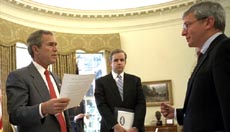
|
What do we mean by "Effective"?
OMB Director Rob Portman and Deputy for Management Clay Johnson hosted an April l9th meeting of the Federal Government's management councils - the Chief Human Capital Officers, the Chief Financial Officers, the Chief Information Officers, the Chief Acquisition Officers, the Budget and Performance Integration Management Officers, and the Inspectors General. The meeting's purpose was to discuss how we can make government more effective. Agencies are increasingly complying with the strictures of the President's Management Agenda, even though the requirements in many instances have gotten more challenging. Unfortunately, examples of how we've made government more effective are not as plentiful as they should be. We can do better. But how? Someone at the meeting asked: What do we mean by "effective?" The answer: what we mean by effective is making programs work better every year. What programs do - distribute funds, issue regulations, pay credits, or even provide direct service - must help agencies accomplish their mission, outcomes that matter to the American people. Of course, success must be measured in terms of outcomes. It doesn't matter how many regulations we issue or how tough they are. If the air's no cleaner as a result of them, then our clean air programs fail. It doesn't matter how efficient we are at grant making. If grantees don't help communities grow economically, then our community and economic development programs don't work. No matter how much more money we spend, if our math and science programs don't help kids learn math and science, they aren't achieving their purpose and should be fixed. When we find examples of programs that work, we should advertise them widely. The Mentoring Children of Prisoners program, for example, was designed based on research that indicates young people in long term mentoring relationships are:
This program has matched almost 50,000 children of prisoners with long-term mentors. The program's participants are expected show the gains listed above. Until they do, we won't be able to say definitively that the program is a success. I'm confident they will. When we know a program doesn't work, we must fix it or end it. ExpectMore.gov is a tool we can use to hold all programs accountable for being more effective. As a deliverable this quarter, we're asking all President's Management Council members to attest that they are proud of the steps programs are taking to improve. If they are, then I'm confident programs will become more effective --- make an even bigger difference in the lives of Americans than they do today. |